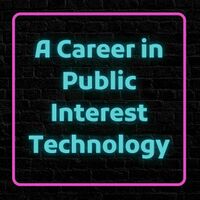A Career in Public Interest Technology

- Who: Daniel Kahn Gillmor
- Date: Tuesday, May 23rd
- Time: 10am EDT / 2pm UTC (What time is it in my city?)
- Language: English
- Location: Zoom
RSVP: https://digitalrights.formstack.com/forms/welcometodigitalrights
A Career in Public Interest Technology with Daniel Kahn Gillmor
Technologists can do much more than code. They can also play key leadership roles in the field of public interest technology, or using technology for public good. Finding good technologists to join the cause has become even more critical as civil society across the globe face more threats sitting at the intersection of social justice, human rights and technology.
Join ACLU’s Senior Staff Technologist, Daniel Kahn Gillmor, and find out how he got into this field, what skills you need, and how you can play a key role in helping confront emerging technological threats coming down the road.
Speaker:
Daniel Kahn Gillmor is a Senior Staff Technologist for the American Civil Liberties Union’s (ACLU) Speech, Privacy, and Technology Project, focused on the way our technical infrastructure shapes society and impacts civil liberties As a free software developer and member of the Debian project, he contributes to fundamental tools that shape the possibilities of our information-rich environment. As a participant in the IETF he fosters the creation of new generations of networking and cryptographic protocols designed and optimized for privacy and security.
Notes & Resources
Recording & Resources
We will post the materials soon!
Q&A
What steps can I take to actively participate in protocol development process of the internet? I believe certain skills are required to participate, what skills are those?
Experimentation is one of the key things. I recommend to take a look to systems that can grab buckets of information. You can compare them in Wireshark and see the differences and learn from there. Being able to look at the raw data and reading the documentation is very useful.
Thinking the impact and consequences of the changes you need to make, and even being able to highlight the problem in an accurate form is a very good learning process.
Picking a particular protocol and a particular code and try to understand it: trying to build it so you understand how it's done and try to change it. Free Open Source is key for this. If send a contribution to a certain package and you have a conversation with them and create connections with people, that's great, even if they don't accept your patch.
Check which projects have a Code of Conduct and apply them. Participate in mailing lists, don't be shy.
What proportion of your concerns about how the internet works is focused on social media versus the rest of the internet? Related to this, what areas of research do you think would be most helpful to pursue for academics looking to get into this type of career?
I've been focused on making that the network doesn't serve to censorship and surveillance. I recognize a big open space for the network to put the data on social media's hands. So I try to not to think specifically in social media, because I think that there is a bigger underlying problem. In the USA there is a scenario where social media is critized by right and left sides because they have a lot of power and that's the focus. For me, that's the problem, the power they have as a large multi national power. Having decentralized platforms and social media would be a great opportunity.
There is so much to study. As an academic, you want data and social media platforms have that data. So you may join the enemy or have limited information and this is a real challenge.
As a public interest technologist, did you learn across the different areas of technology like cybersecurity, software development, AI, robotics, networking and others?
You have to know what you don't know. I am not an expert on everything, I know some things. Find allies that are experts in certain things. We do have to think in these pieces together, but we can't know everything.